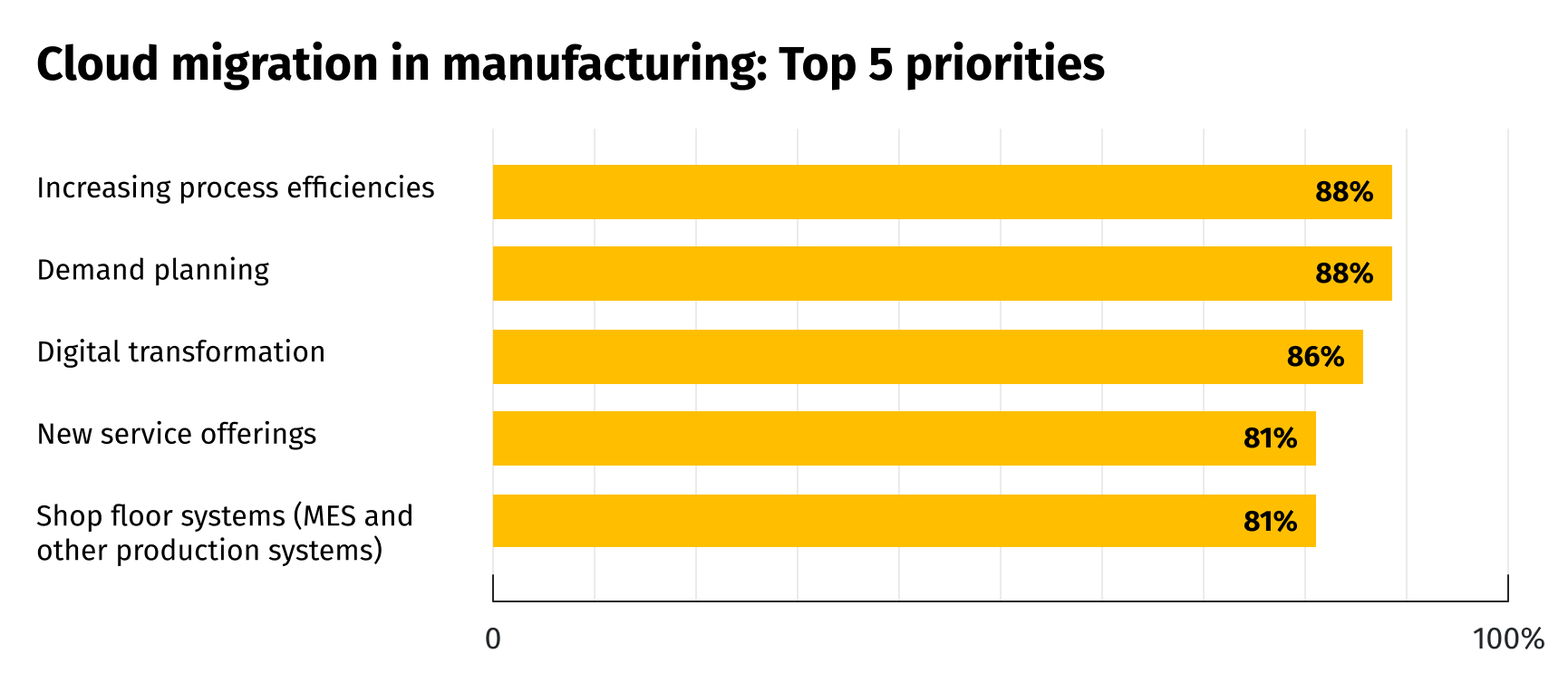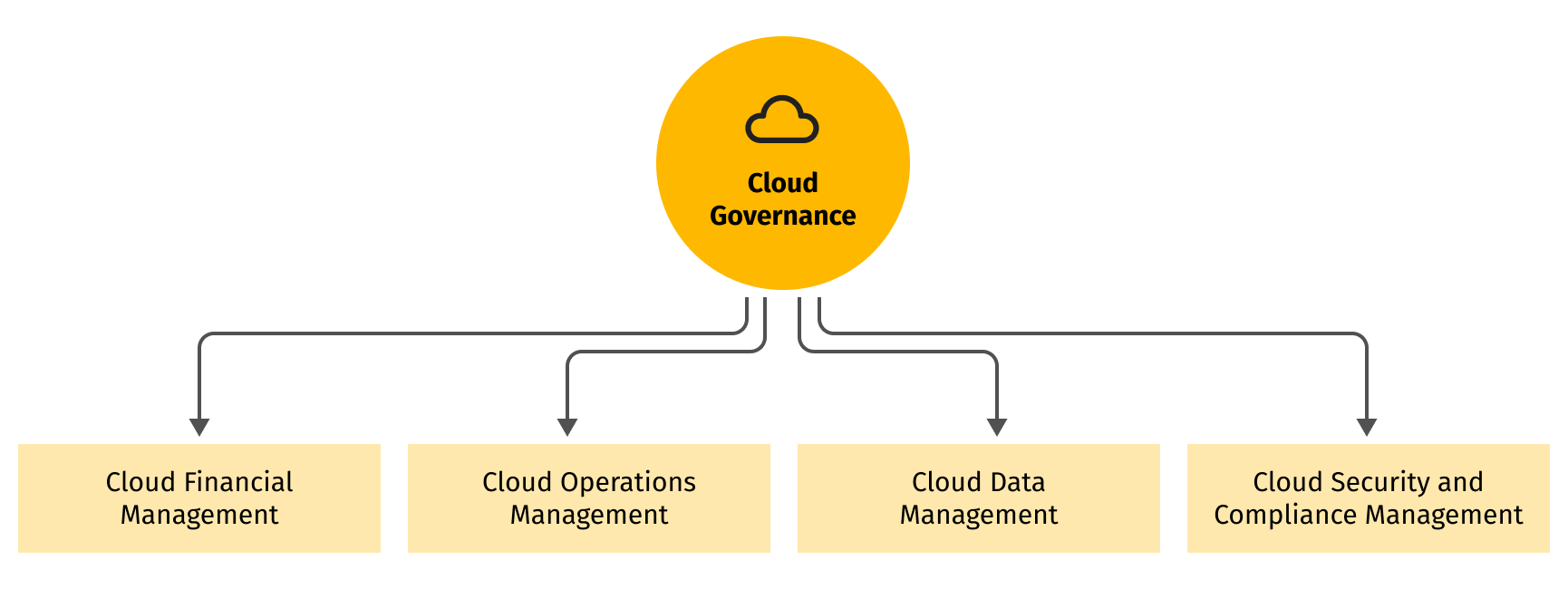
Smart manufacturing: Navigating change management, automation, and governance in the cloud
Cloud technologies are increasingly becoming the way to set IT infrastructure across various sectors. Today, many businesses opt for a cloud-first strategy for deploying their software, applications, and databases, rather than relying on traditional on-premises systems.
In fact, over the past several years, the growth in enterprise spending on public cloud services has picked up significantly from the modest pace seen in no-cloud infrastructure spending. The global expenditure amounted to \$412 billion in 2021, while in 2022 it went up 18.8%, exceeding \$490 billion. It is predicted to grow another 20.7% to total \$591.8 billion in 2023, according to the latest forecast from Gartner. When it comes to cloud implementation, manufacturing is the new growth sector. Market Research Future states that the sector is forecasted to attain $111.9 billion worth of industrial cloud investment by 2024. In that case, the coming year can be crucial to establishing a new way of working in a digital and collaborative environment, and achieving long-lasting business outcomes.In this article, we will discuss how manufacturing companies around the globe are harnessing cloud technology to excel in the digital acceleration race, and transform the future of production.
Inside cloud manufacturing
Cloud computing has gained traction with manufacturers in particular because it lays the foundations for efficient production management, increased speed in the delivery of new products and services, dynamic reporting, and full visibility into data insights across the entire organization. It enables manufacturing companies to streamline their processes, enhance quality control, and meet the ever-changing demands from customers and market dynamics.

How does cloud manufacturing work
The growing importance of the cloud gave rise to a new production concept – cloud manufacturing – which transforms traditional manufacturing facilities into smart factories of the future, paving the way for Industry 4.0.
Cloud manufacturing refers to the process of running a company's programs, applications, and platforms using cloud technology, analytics and intelligence, the Internet of Things (IoT), and advanced engineering. It democratizes access to cutting-edge hardware, software, and tools that are provided online under the anything-as-a-service (XaaS) business model.
This way, the manufacturing tech infrastructure is not tied physically to any network, server, or equipment, but is obtainable anytime across multiple locations, as long as there are internet access points available. This enables connectivity of all the elements of the system, from procurement to production, and later to inventory management and customer experience, ensuring data transparency across the value chain. Furthermore, cloud-based manufacturing solutions are designed to handle the big data associated with mass production, guaranteeing the agility, scalability, and continuity of manufacturing processes.
Benefits of the cloud for manufacturing
While the idea of disconnecting from the local infrastructure grid still intimidates some of the industry players, migrating manufacturing mainframes to the cloud is the way of the future. According to Salesforce’s New Trends in Manufacturing report, forward-looking manufacturers that view moving to the cloud as their critical priority are three times more likely to quickly adjust their operations in response to any potential market disruptions. 81% of those who have already incorporated cloud computing in their business flow, feel their systems and technology are ready to handle the decade ahead. Let’s flash a spotlight on some of the benefits of cloud-based manufacturing that inspire such confidence:- Resource management
Resource allocation is the first step in production planning. It requires a meticulous calculation of raw materials, components, equipment, and labor needed to manufacture a product. With cloud enterprise resource planning (ERP), industrial companies can gather information from multiple sources and get better visibility into resource availability, cost, and the estimated time of delivery to ensure smooth production workflows, and avoid quality issues such as defects and bottlenecks that may cause delays. - Supply chain optimization
A cloud manufacturing platform integrates supply chain flows and operational processes, such as logistics, warehousing, manufacturing, sales, and returns, in a highly configurable digital ecosystem. Employing intelligent tools that use machine learning and optimization algorithms, the system can identify the most efficient sourcing and logistics options in real time, and suggest them to end users, improving the quality of business decisions and accelerating the supply chain optimization process. - Machine Monitoring
With the help of cloud-based IoT systems, manufacturers can track crucial operational metrics, such as equipment availability, capacity utilization, energy usage, as well as the surrounding temperature, acceleration, displacement, and sound frequencies to ensure machine health, plan timely maintenance schedules, and quickly solve any production issues. - Production Quality
Cloud manufacturing solutions come with advanced analytical capabilities that can collect and evaluate data, images, and videos from thousands of machines, hundreds of locations, and multiple suppliers to enable great production quality. They take into account different production variables, ensuring anomaly detection with high accuracy. - Streamlined production cycle
Cloud computing empowers manufacturers to employ digital twin and virtual prototyping technologies, offering a secure and protected environment for product modeling and testing. Running simulations in the cloud provides businesses with valuable insights for improvements and/or redesigning production parts, abolishing the need for multiple iterations and reducing go-to-market time.
Cloud adoption in the manufacturing industry
Manufacturing companies have made more progress than those of other sectors in adopting cloud computing for core business functions. Around 40% of industry players claim it is a game-changing technology in key manufacturing activities, including IT and operations, production planning, procurement and supply chain, as well as product development, R&D, and innovations.
According to recent research, manufacturing has proportionately more cloud leaders than any other vertical: 32% vs. 18%. Such a level of maturity is explained by a clear course towards cloud migration or adoption of cloud-enabled applications, the above-average number of advanced technologies they use with the cloud, and the high percentage of total applications that are cloud-based.Industry leaders follow a specific approach to cloud adoption. This approach incorporates specific strategies that drive outstanding results, position businesses for greater ROI, and offer a roadmap for a smooth transition toward smart manufacturing. Those manufacturing cloud best practices are change management, cloud governance, and industrial automation.
Delivering change management in the cloud
Managing changes to the organization’s infrastructure, processes, and services in the digital age calls for fresh thinking and alignment of culture, leadership, and motivation. These factors are often overlooked, since around 20% of enterprises lack a clear cloud adoption strategy that defines how the technology will be used, deployed, and integrated at every stage of the product life cycle, from the factory floor to the customer door. The key to reinforcing positive developments and achieving the true business value of the cloud is manufacturing change management.
Change management is the process of bringing cloud smart manufacturing to fruition, from the earliest stages of preparation and planning, through implementation and, finally, to resolution. It encompasses all the factors that most influence transformation initiatives, including technical aspects, compliance requirements, change authorities hierarchy, and additional concerns.
Manufacturers leverage cloud change management for the following use cases:
- Facilitating faster implementations, allowing industrial companies to meet their innovation and transformation objectives;
- Enabling improvements with minimum disruption to factory IT systems to eliminate risks to the production environment;
- Reducing time lag due to lengthy approval processes, which is achieved by instilling greater autonomy with product and infrastructure teams;
- Enabling the success of change projects, allowing businesses to find ROI from the tools in which they have invested.
Implementing cloud governance for smooth change management
The importance of cloud computing in manufacturing is growing by leaps and bounds. However, introducing any changes to business processes or technology infrastructure runs the risk of poor integration between cloud systems, duplication of effort or data within different groups in the organization, and weak or lacking access control. To handle the overall efficiency of the digital transformation process, manufacturing companies must have certain rules governing migration from on-premises to the cloud.
Cloud governance is the set of policies or principles that help businesses navigate through the adoption, utilization, and management of cloud technology services. It ensures proper asset deployment, enhanced data security, adherence to compliance obligations, and smooth operation of the system.

To fully realize those benefits manufacturers have to come up with a sound governance strategy. It encompasses the following four components:
- Cloud financial management
Cost savings are one of the major drivers of cloud adoption in manufacturing. Cloud governance helps businesses to determine how to optimize spending across the organization’s value chain and boost their returns on cloud investments. It’s achieved by introducing financial policies that impose cost control for all cloud solutions to be deployed, budgets specifying allowance for different elements of IT/OT systems, and cost reporting tools. - Cloud operations management
Designing and building business structures, practices, and operations in the cloud offers a level of efficiency that could make a big difference to a company’s success. A cloud governance strategy streamlines this process by organizing multiple accounts that represent different departments, projects or teams, and provides those units with access to the cloud systems as per their requirement and designation. Such segregation of cloud workloads is an excellent way to improve cloud resource allocation, and to prevent fragmented, redundant, and unmanaged applications sitting on the enterprise virtual vault. - Cloud data management
The cloud makes it easier to collect, analyze and interpret large volumes of data. Therefore, cloud governance should set the rules for ensuring that the data used for business intelligence comes from the correct sources and doesn't get corrupted in the process. Having such data governance policies in place allows manufacturers to monitor, control, and automate the security, integrity, availability, and use of data in a cloud computing environment. - Cloud security and compliance management
As manufacturing companies move to the cloud, certain risks related to data storage, visibility of sensitive information, and application service management may arise. These issues are often caused by unauthorized downloads/ installation of software, storage of illegal data, and access to restricted sites by users. Cloud governance leverages the existing security practices and extends them to the cloud, covering all the key topics of enterprise digital safety, including risk assessment, identity and access management, data classification and encryption, application security, and responding to non-compliant activities.
Achieving industrial automation with cloud-based solutions
Today, the manufacturing industry is on the cusp of a new automation era: rapid advances in technology are enabling businesses to create, modify, and tear down resources on the cloud with little to no manual effort. Cloud automation tools deliver the ability to streamline workflows by removing human process errors, and eliminating delays due to less reliance on qualified staff. Manufacturers are also looking to these advancements to keep operations lean, efficient, and productive. Here is a breakdown of the key benefits of cloud computing in industrial automation:
- Workload management. Cloud-based manufacturing software helps enterprises monitor their environment, tracking what is running and clearing unused capabilities. This enables manufacturers to measure, provision, and configure resources, adapting the infrastructure to actual operating requirements and automatically adjusting workloads as needed.
- Infrastructure rollout. Continuous software development relies upon automation for various steps, from code scans and version control to testing and deployment.
- Improved security. Cloud environments can be enhanced with automated security controls that govern access to applications, systems or data, and scan all the interactions with the system for vulnerabilities and unusual performance levels.
- System setup. Cloud automation offers capabilities for establishing virtual machine clusters, creating storage logical unit numbers, (LUNs), invoking virtual networks, and monitoring and managing the availability and performance of all system components.
To enjoy these cutting-edge capabilities you will need to create automation centers of excellence that combine the expertise of SMEs supporting a manufacturing network, fully-integrated sensing equipment (vision systems, in-line sampling analysis, etc.), and basic processes to identify, evaluate, and implement automation. These components are then linked and orchestrated by specialized cloud tools and capabilities offered by all major public cloud providers, such as AWS, Google, or Azure.
Cloud computing for manufacturing: Conclusion
Cloud computing can be applied to all stages of the manufacturing process, from demand forecasting, designing, testing, production, and go-to-market strategies. It enables manufacturers to achieve greater efficiency, flexibility, and cost-effectiveness by automating routine tasks, quickly scaling production, facilitating collaboration, improving data management, and offering greater customization of products.
Are you interested in adopting cloud technology to enhance your production environment? Get in touch with us to discuss how it can help you meet your business needs.
